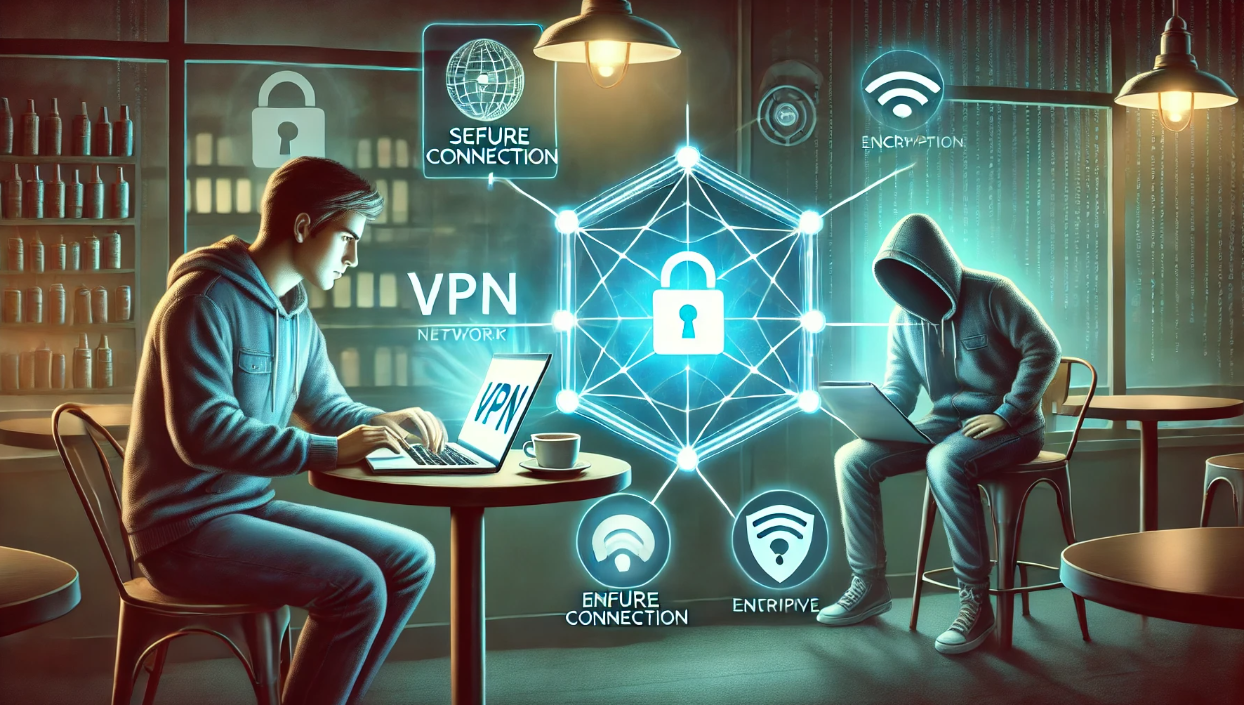How VPNs Protect Your Data on Public Wi-Fi Networks
Public Wi-Fi networks—found in coffee shops, airports, hotels, and shopping malls—are convenient but highly insecure. Cybercriminals often exploit these open networks to steal personal data, inject malware, and launch man-in-the-middle (MITM) attacks.
A VPN (Virtual Private Network) is one of the best tools to protect your data when using public Wi-Fi. By encrypting your internet traffic and masking your IP address, a VPN keeps your personal information safe from hackers and prying eyes.
In this guide, we’ll explore how VPNs protect your data on public Wi-Fi, the threats they defend against, and why you should always use one when connecting to unsecured networks.
1. The Risks of Using Public Wi-Fi Without a VPN
Public Wi-Fi networks lack encryption, meaning data transmitted between your device and the internet is often unencrypted and visible to anyone nearby. Here are some common threats:
Man-in-the-Middle (MITM) Attacks
Cybercriminals can intercept and alter data transmitted between your device and the website you’re visiting, potentially stealing:
✅ Login credentials
✅ Banking information
✅ Emails and private messages
Packet Sniffing
Hackers use tools like Wireshark to capture unencrypted network traffic, gaining access to:
✅ Personal data
✅ Browsing activity
✅ Online transactions
Fake Wi-Fi Hotspots (Evil Twin Attacks)
Attackers create fake Wi-Fi networks with names like “Free Airport Wi-Fi” or “Starbucks_Guest”. Once users connect, they unknowingly share data with the hacker.
Session Hijacking
An attacker steals your login session cookies, granting them unauthorized access to accounts like Gmail, Facebook, or online banking.
Malware Injection
Hackers can exploit vulnerabilities in public Wi-Fi to inject malware into your device, compromising your security.
➡ Solution? Use a VPN!
2. How a VPN Protects Your Data on Public Wi-Fi
A VPN creates a secure, encrypted tunnel between your device and a private server, ensuring that even if a hacker intercepts your data, they cannot read it.
Encryption Shields Your Data
VPNs use AES-256 encryption, the same standard used by military and financial institutions, to scramble your internet traffic.
✅ Prevents hackers from stealing your passwords and personal information.
✅ Encrypts sensitive transactions like online banking and shopping.
✅ Makes intercepted data unreadable to cybercriminals.
Hides Your IP Address
A VPN masks your real IP address and assigns you a new one from a secure server, protecting your online identity and location.
✅ Stops websites and ISPs from tracking your online activity.
✅ Prevents location-based restrictions and censorship.
✅ Helps you stay anonymous while browsing.
Protects Against Fake Wi-Fi Hotspots
Even if you accidentally connect to a malicious Wi-Fi network, a VPN:
✅ Encrypts all outgoing and incoming traffic.
✅ Prevents hackers from injecting malware or stealing your credentials.
Secure DNS Requests to Avoid Tracking
Public Wi-Fi often uses insecure DNS servers, allowing ISPs and hackers to track which websites you visit. A VPN uses private DNS servers to:
✅ Prevent tracking by third parties.
✅ Stop ISPs from collecting browsing data.
✅ Reduce the risk of phishing and malicious redirects.
➡ With a VPN, even if you’re using an unsecured public Wi-Fi network, your data remains safe, encrypted, and private.
3. Step-by-Step: How to Use a VPN on Public Wi-Fi
✅ 1. Choose a Reliable VPN Service
Select a trusted VPN provider with strong encryption and a zero-logs policy, such as:
NordVPN
ExpressVPN
Surfshark
ProtonVPN
✅ 2. Install the VPN App
Download the VPN app on your laptop, smartphone, or tablet before connecting to public Wi-Fi.
✅ 3. Enable Auto-Connect for Public Wi-Fi
Most VPNs offer an automatic protection feature for public networks. Enable it to ensure you’re always protected.
✅ 4. Connect to a Secure VPN Server
Choose a nearby VPN server to maintain fast speeds while encrypting your traffic.
✅ 5. Enable the Kill Switch
A kill switch automatically disconnects you from the internet if your VPN connection drops, preventing accidental data leaks.
4. Additional Security Tips When Using Public Wi-Fi
Turn Off Auto-Connect for Wi-Fi – Prevent your device from automatically joining unsecured networks.
Use HTTPS Websites – Ensure websites you visit use HTTPS for secure connections.
Disable File Sharing – Turn off AirDrop (Mac/iOS) and Nearby Share (Android) to prevent unauthorized access.
Avoid Logging Into Sensitive Accounts – Don’t access banking or email accounts unless absolutely necessary.
Conclusion
Using public Wi-Fi without a VPN puts your personal data at serious risk. Cybercriminals can easily intercept your online activities, steal sensitive information, and even take over your accounts.
✅ A VPN protects you by encrypting your traffic, hiding your IP address, and blocking cyber threats, ensuring a safe and private browsing experience on public networks.
Final Takeaways:
✔ Always connect to a VPN before using public Wi-Fi
✔ Choose a reliable VPN provider with strong encryption
✔ Enable automatic VPN protection for public networks
✔ Use additional security measures like HTTPS and kill switches
By using a VPN, you can confidently connect to public Wi-Fi without worrying about hackers, surveillance, or data theft. Stay safe, stay encrypted, and keep your personal information private wherever you go.

